| Listing 1 - 6 of 6 |
Sort by
|
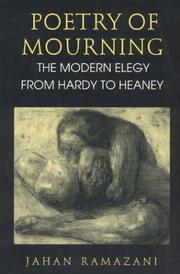
ISBN: 0226703398 0226703401 9780226703404 Year: 1994 Publisher: Chicago London University of Chicago Press
Abstract | Keywords | Export | Availability | Bookmark
 Loading...
Loading...Choose an application
- Reference Manager
- EndNote
- RefWorks (Direct export to RefWorks)
Called the "mother of beauty" by Wallace Stevens, death has been perhaps the favorite muse of modern poets. From Langston Hughes's lynch poems to Sylvia Plath's father elegies, modern poetry has tried to find a language of mourning in an age of mass death, religious doubt, and forgotten ritual. For this reason, Jahan Ramazani argues, the elegy, one of the most ancient of poetic genres, has remained one of the most vital to modern poets. Through subtle readings of elegies, self-elegies, war poems, and the blues, Ramazani greatly enriches our critical understanding of a wide range of poets, including Thomas Hardy, Wilfred Owen, Wallace Stevens, Langston Hughes, W. H. Auden, Sylvia Plath, and Seamus Heaney. He also interprets the signal contributions to the American family elegy of Robert Lowell, Allen Ginsberg, Anne Sexton, John Berryman, Adrienne Rich, Michael Harper, and Amy Clampitt. Finally, he suggests analogies between the elegy and other kinds of contemporary mourning art--in particular, the AIDS Memorial Quilt and the Vietnam Veterans Memorial. Grounded in genre theory and in the psychoanalysis of mourning, Ramazani's readings also draw on various historical, formal, and feminist critical approaches. This book will be of interest to anyone concerned with the psychology of mourning or the history of modern poetry. "Consists of full, intelligent and lucid exposition and close reading. . . . 'Poetry of Mourning' is itself a welcome contribution to modern poetry's search for a 'resonant yet credible vocabulary of grief in our time."--'Times Literary Supplement'
Poetry --- English literature --- American literature --- American poetry --- Elegiac poetry, American --- Elegiac poetry, English --- English poetry --- Grief in literature. --- Mourning customs in literature. --- History and criticism. --- English-speaking countries --- Intellectual life --- American elegiac poetry --- Chagrin dans la littérature --- Deuil--Coutumes dans la littérature --- Grief in literature --- Mourning customs in literature --- Rouwgebruiken in de literatuur --- Verdriet in de literatuur --- History and criticism --- 20th century --- Elegiac poetry [English ] --- Elegiac poetry [American ] --- Elegiac poetry, English - History and criticism. --- Elegiac poetry, American - History and criticism.
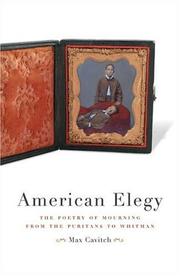
ISBN: 081664893X 9780816648931 9780816648924 0816648921 0816698856 Year: 2007 Publisher: Minneapolis London University of Minnesota Press
Abstract | Keywords | Export | Availability | Bookmark
 Loading...
Loading...Choose an application
- Reference Manager
- EndNote
- RefWorks (Direct export to RefWorks)
Bereavement in literature --- Chagrin dans la littérature --- Death in literature --- Deuil--Coutumes dans la littérature --- Dood in de literatuur --- Grief in literature --- Mort dans la littérature --- Mourning customs in literature --- Rouwgebruiken in de literatuur --- Sterfte in de literatuur --- Verdriet in de literatuur --- Elegiac poetry, American --- American poetry --- Mourning customs in literature. --- Grief in literature. --- Death in literature. --- History and criticism. --- American elegiac poetry --- History and criticism --- Elegiac poetry [American ] --- Emerson, Ralph Waldo --- Criticism and interpretation --- Whitman, Walt --- Wheatley, Phillis --- Lincoln, Abraham
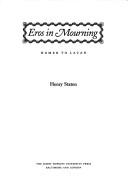
ISBN: 0801849233 Year: 1995 Publisher: Baltimore, Md. Johns Hopkins University Press
Abstract | Keywords | Export | Availability | Bookmark
 Loading...
Loading...Choose an application
- Reference Manager
- EndNote
- RefWorks (Direct export to RefWorks)
Eros in Mourning begins with a reading of the Iliad which shows how Homer, not yet influenced by the ideology of transcendence, analyzes the structure of unassaugeable mourning in a way that is as up-to-date as the latest poststructuralism. Then, in readings of the Gospel of John, Dante, the troubadours, Petrarch, Hamlet, Paradise Lost, La Princess de Clèves, and Heart of Darkness, Staten shows how literary history may be reconstituted in terms of a poetics of mourning that keeps in sight the traditional problematic of mortal and transcendent eros. Finally, a reading of Lacan suggests that this writer--so profoundly influential today on the question of desire--must be understood in the context of the dialectic of mourning that dominates his work. [publisher's description]
Begeerte in de literatuur --- Desire in literature --- Deuil--Coutumes dans la littérature --- Désir dans la littérature --- Loss (Psychology) in literature --- Mourning customs in literature --- Perte (Psychologie) dans la littérature --- Rouwgebruiken in de literatuur --- Verlies (Psychologie) in de literatuur --- Literature --- -Loss (Psychology) in literature --- Grief in literature --- Belles-lettres --- Western literature (Western countries) --- World literature --- Philology --- Authors --- Authorship --- History and criticism --- -Theory, etc --- Desire in literature. --- Grief in literature. --- Loss (Psychology) in literature. --- Theory, etc. --- Mourning in literature. --- History and criticism&delete& --- Theory, etc --- Literature History and criticism --- Lamentations --- Pleurs --- Desir dans la litterature --- Mort dans la litterature --- Litterature --- Histoire et critique --- Theorie, etc.
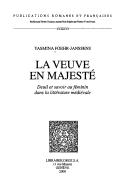
ISSN: 00797812 ISBN: 260000422X 9782600004220 Year: 2000 Volume: 226 Publisher: Genève: Droz,
Abstract | Keywords | Export | Availability | Bookmark
 Loading...
Loading...Choose an application
- Reference Manager
- EndNote
- RefWorks (Direct export to RefWorks)
Romance literature --- Thematology --- anno 1200-1499 --- Deuil--Coutumes dans la littérature --- Literature [Medieval ] --- Literatuur [Middeleeuwse ] --- Littérature médiévale --- Medieval literature --- Middeleeuwse literatuur --- Mourning customs in literature --- Rouwgebruiken in de literatuur --- French literature --- Latin literature, Medieval and modern --- Widows in literature --- Bereavement in literature --- Littérature française --- Littérature latine médiévale et moderne --- Veuves dans la littérature --- Deuil dans la littérature --- History and criticism --- Histoire et critique --- Literature, Medieval --- Women in literature --- Grief in literature --- 82.04 --- 840 "04/14" --- Belgian literature (French) --- -Belgian literature (French) --- -French literature --- Belgian literature --- Literaire thema's --- Franse literatuur--Middeleeuwen --- Belgian authors --- -Literaire thema's --- 840 "04/14" Franse literatuur--Middeleeuwen --- 82.04 Literaire thema's --- -82.04 Literaire thema's --- Littérature française --- Littérature latine médiévale et moderne --- Veuves dans la littérature --- Deuil dans la littérature --- Woman (Christian theology) in literature --- Women in drama --- Women in poetry --- French literature - To 1500 - History and criticism --- Literature, Medieval - History and criticism
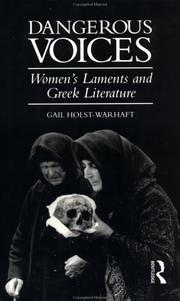
ISBN: 0415072492 Year: 1992 Publisher: London New York Routledge
Abstract | Keywords | Export | Availability | Bookmark
 Loading...
Loading...Choose an application
- Reference Manager
- EndNote
- RefWorks (Direct export to RefWorks)
Bereavement in literature --- Death in literature --- Deuil--Coutumes dans la littérature --- Dood in de literatuur --- Klaagliederen in de literatuur --- Lamentations dans la littérature --- Laments in literature --- Mort dans la littérature --- Mourning customs in literature --- Rouwgebruiken in de literatuur --- Sterfte in de literatuur --- Greek literature --- -Laments --- -Mourning customs in literature --- Women --- -Literature and society --- -Mourning customs --- -Women and literature --- -Literature --- Manners and customs --- Rites and ceremonies --- Funeral rites and ceremonies --- Literature --- Literature and sociology --- Society and literature --- Sociology and literature --- Sociolinguistics --- Human females --- Wimmin --- Woman --- Womon --- Womyn --- Females --- Human beings --- Femininity --- Complancha --- Lamentations --- Elegiac poetry --- Mourning customs --- Balkan literature --- Byzantine literature --- Classical literature --- Classical philology --- Greek philology --- History and criticism --- Social conditions --- Social aspects --- -History and criticism --- Laments --- Literature and society --- Women and literature --- Greece --- History --- Greek literature - History and criticism. --- Literature and society - Greece - History. --- Women and literature - Greece - History. --- Mourning customs - Greece - History. --- Women - Greece - Social conditions. --- Mourning customs in literature. --- Laments - Greece - History. --- Laments in literature. --- Death in literature.
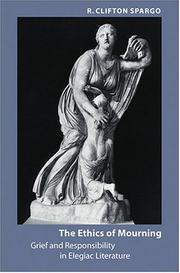
Abstract | Keywords | Export | Availability | Bookmark
 Loading...
Loading...Choose an application
- Reference Manager
- EndNote
- RefWorks (Direct export to RefWorks)
'The Ethics of Mourning' dramatically shifts the critical discussion of the lyric elegy from psychological economy to ethical responsibility. Beginning from a reevaluation of famously inconsolable mourners such as Niobe and Hamlet, R. Clifton Spargo discerns the tendency of all grief to depend at least temporarily upon the refusal of consolation. By disrupting the traditional social and psychological functions of grief, resistant mourners transform mourning into a profoundly ethical act. Spargo finds such examples of ethical mourning in opposition to socially acceptable expressions of grief throughout the English and American elegiac tradition. Drawing on the work of Paul Ricoeur, Bernard Williams, and Emmanuel Levinas, his book explores the ethical dimensions of anti-consolatory grief through astute readings of a wide range of texts -- including treatments of Hamlet, Milton, and Renaissance elegists, extended readings of Dickinson, Shelley, and Hardy, and final chapters on American Holocaust elegies by Sylvia Plath and Randall Jarrell. Spargo argues that, to the extent that elegies are melancholic, to the extent that they resist the history of consolation and the strategies of commemoration implicit in elegiac conventions, they make an extraordinary ethical demand on us, asking that we remain in relationship to the other, even past the point of all usefulness. In the wake of the atrocities of the twentieth century, particularly the Holocaust, Spargo finds the crisis in the project of commemoration to be an event already inscribed with ethical meaning. He argues for the particular capacity of literature to undertake an imaginative risk on behalf of another that seems the very ground of ethics itself.
Bereavement in literature --- Chagrin dans la littérature --- Death in literature --- Deuil--Coutumes dans la littérature --- Dood in de literatuur --- Ethics in literature --- Ethiek in de literatuur --- Ethique dans la littérature --- Grief in literature --- Holocaust [Jewish ] (1939-1945) in literature --- Holocaust [Joodse ] (1939-1945) in de literatuur --- Holocaust juif (1939-1945) dans la littérature --- Loss (Psychology) in literature --- Mort dans la littérature --- Mourning customs in literature --- Perte (Psychologie) dans la littérature --- Rouwgebruiken in de literatuur --- Sterfte in de literatuur --- Verdriet in de literatuur --- Verlies (Psychologie) in de literatuur --- 82-14 --- 82.04 --- Lyriek. Minnezang. Religieuze poëzie. Lied --- Literaire thema's --- American literature --- Bereavement. --- Conduct of life. --- Death in literature. --- Elegiac poetry, American --- Elegiac poetry, English --- Elegiac poetry. --- English literature --- Ethics in literature. --- Ethics. --- Grief in literature. --- Grief. --- Holocaust, Jewish (1939-1945) --- Holocaust, Jewish (1939-1945), in literature. --- Judaism and literature --- Loss (Psychology) in literature. --- Mourning customs in literature. --- History and criticism. --- 82-14 Lyriek. Minnezang. Religieuze poëzie. Lied --- 82.04 Literaire thema's --- Holocaust, Jewish (1939-1945). --- History and criticism --- Elegiac poetry [English ] --- Elegiac poetry [American ] --- English-speaking countries
| Listing 1 - 6 of 6 |
Sort by
|

 Search
Search Feedback
Feedback About UniCat
About UniCat  Help
Help News
News